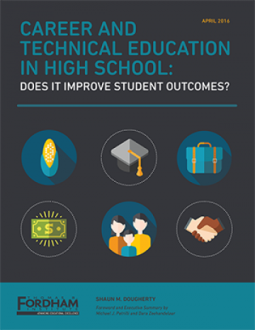Fordham’s latest study, by the University of Connecticut's Shaun M. Dougherty, uses data from Arkansas to explore whether students benefit from CTE coursework—and, more specifically, from focused sequences of CTE courses aligned to certain industries. The study also describes the current landscape, including which students are taking CTE courses, how many courses they’re taking, and which ones.
Key findings include:
- Students with greater exposure to CTE are more likely to graduate from high school, enroll in a two-year college, be employed, and earn higher wages.
- CTE is not a path away from college: Students taking more CTE classes are just as likely to pursue a four-year degree as their peers.
- Students who focus their CTE coursework are more likely to graduate high school by twenty-one percentage points compared to otherwise similar students (and they see a positive impact on other outcomes as well).
- CTE provides the greatest boost to the kids who need it most—boys, and students from low-income families.
Due to many decades of neglect and stigma against old-school “vo-tech,” high-quality CTE is not a meaningful part of the high school experience of millions of American students. It’s time to change that.
Additional resources:
- Information graphic (.pdf)
- Information graphic segmented images (.zip/.png)
- Social media images (.zip/.png)
- Tables and figures from the report (.zip/.png)
- Shaun Dougherty's presentation of findings (.pdf)
Policy Priority:
Topics:



